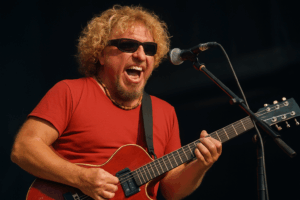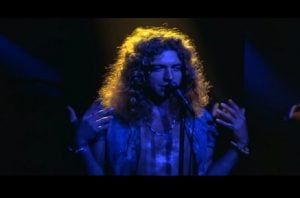Ex-Whitesnake Guitarist Steve Vai Pays Tribute to David Coverdale

via Greg / YouTube
David Coverdale’s decision to step away from the stage after more than fifty years has stirred emotional reactions across the rock world, but few hit as sincerely as Steve Vai’s tribute. Vai, who briefly stepped into the Whitesnake lineup at the turn of the 1990s, offered a message that blended admiration, gratitude, and a sense of shared history. His post wasn’t simply a farewell; it felt like a musician talking directly to another musician whose influence reaches far beyond chart numbers.
Their connection stretches back to the Slip of the Tongue era, a period that challenged traditional expectations of the Whitesnake sound. Vai joined under unusual circumstances, filling in while Adrian Vandenberg battled a wrist injury, and the album ended up becoming one of the densest and most distinctive guitar records in the band’s catalog. Even in that short window, Vai was close enough to see the intensity and drive that Coverdale brought into every performance.
That perspective helps explain why his tribute feels so personal. Vai isn’t praising Coverdale as an outsider or casual collaborator—he’s speaking as someone who has shared rehearsal rooms, tour buses, backstage rituals, and the weight of delivering night after night. In a way, his message encapsulates what many longtime fans have been feeling: gratitude for a voice and presence that shaped decades of rock music.
View this post on Instagram
A Career That Left an Imprint on Everyone Around Him
Vai’s message opened with a celebration of Coverdale’s longevity, but it quickly shifted to the qualities that made him more than just a long-running frontman. He highlighted the power of Coverdale’s voice—something intense enough, as Vai described it, to “level a mountain.” But he also pointed out the instincts behind that voice: the sense of melody, the swagger, and the unmistakable attitude that carried Whitesnake through many lineups and musical shifts.
Even during his brief time in the band, Vai witnessed how Coverdale operated onstage. Whitesnake’s 1989–1990 tour was ambitious, bombastic, and physically demanding, yet Coverdale delivered every night without slipping into routine or fatigue. Vai’s description of 119 consecutive shows paints a picture of a singer who never coasted even when his voice and body were pushed to the limit.
His reflections also underscore the importance of band chemistry in that era. Surrounded by players like Adrian Vandenberg, Rudy Sarzo, and Tommy Aldridge, Vai felt he was part of a lineup with tremendous firepower. And at the center of that lineup, Coverdale remained the constant—part ringmaster, part storyteller, part force of nature steering everything forward.
The Last Song They Played Together—and the Meaning Vai Found in It
One of the most striking parts of Vai’s tribute was his memory of Hellfest 2022, the night he unknowingly shared the stage with Whitesnake for what became their final performance. Coverdale invited him up for “Still of the Night,” a song deeply connected to the band’s identity and one that Vai has always enjoyed tearing into. For him, it wasn’t just a cameo; it was a return to a piece of his own musical history.
Looking back, Vai described something poetic about that moment. He hadn’t planned to be part of the band’s last bow, and no one expected that night to carry the weight it now holds. But in retrospect, it marked a symbolic closing of a circle—one last blast of guitars, drums, and Coverdale’s unmistakable presence tying past and present together.
That memory carries a bittersweet edge when paired with Coverdale’s recent announcement. It transforms what seemed like a casual festival moment into a milestone. Vai’s tribute captures that feeling without melodrama; it’s the acknowledgement of a rare coincidence that only gains significance once time adds context.
A Friendship That Outlasted Touring Schedules and Album Cycles
Vai’s tribute wasn’t only about professional respect; it was about personal connection. He made a point to say that what matters most after decades in the industry isn’t chart success or massive stages, but the people encountered along the way. That sentiment gives weight to his gratitude for Coverdale—not as a frontman, but as a friend.
Their post-Whitesnake relationship has endured for more than three decades. They’ve reconnected for interviews, virtual reunions, and industry events, but the tone of Vai’s message suggests something deeper than occasional professional overlap. He spoke of Coverdale’s kindness and consistency, praising his character as much as his talent.
And while Vai is known for his technical brilliance and experimental guitar approach, he still cites Coverdale as his “all-time favorite rock voice.” It’s a simple statement, but it lands with honesty. It tells readers that even someone who has played with Frank Zappa, David Lee Roth, and countless guitar greats has a special place reserved for the Whitesnake frontman’s golden-era vocals.
Coverdale Steps Back, but His Influence Stays Everywhere
Coverdale’s decision to retire wasn’t rooted in fading passion—it was a matter of health. The last few years brought infections, respiratory issues, and the lingering effects of a torn rotator cuff, all of which made performing increasingly difficult. His cancellations in 2022 were hard on him, not only physically but emotionally, because he has always taken pride in delivering a full show without compromise.
Even now, Coverdale’s plans don’t include fully disappearing. He has spoken openly about having years’ worth of studio projects lined up, and he’s been approached about residencies and selective appearances. But long-form touring, with the physical toll it demands, is something he can no longer commit to without risking his health.
Vai’s message helps frame this transition in a way that feels dignified rather than somber. Instead of focusing on the end of live touring, he emphasizes the legacy Coverdale already cemented—the records, the shows, the bandmates, and the fans who followed him from the Deep Purple days all the way through Whitesnake’s final chapter. His tribute gently reinforces an idea that feels true: Coverdale didn’t fade out; he stepped back after giving everything he had for decades.












